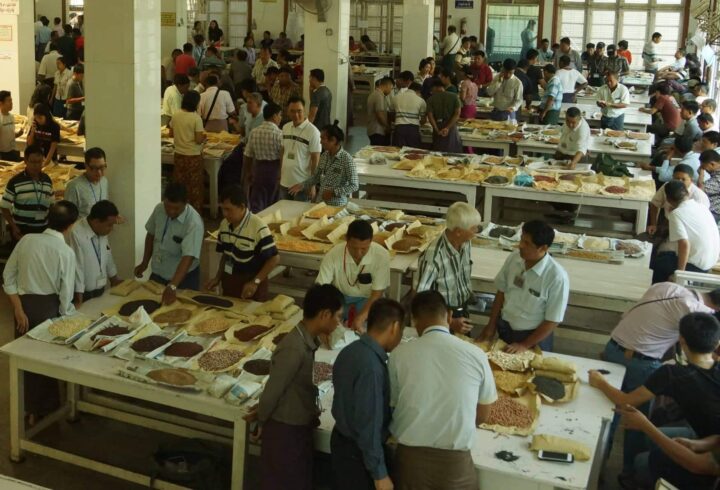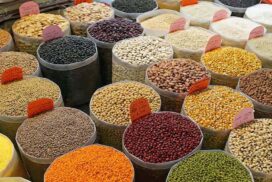The price of black gram held steady at K1,755,000 per tonne in the second week of November, according to the bean market.
The black gram price is related to foreign demand and the kyat-dollar exchange rate. At present, the exchange rate is stable at K3,000 over the counter market.
The CNF (Cost and Freight) price for black gram (urad in India) that were shipped to India were US$950 per tonne of SQ (Special Quality) and $815 per tonne of Fair Average Quality (FAQ). The FOB prices stood at $770 for FAQ.
Approximately 20 to 25 container loads of Myanmar blacks were shipped to India in November. Therefore, the pulses stock is estimated at 15,000 tonnes of black gram and about 20,000 tonnes of pigeon peas, forecasted traders.
Additionally, the National Agricultural Cooperative Marketing Federation of India Ltd. (NAFED) purchased 10,000 tonnes of Myanmar black gram at Indian Rupee 7,100-7,490 per quintal. The demand for black gram is likely to increase in the coming winter due to the strong demand of the millers, according to a report cited by Agri World Mumbai.
At present, the rumour of the resumption of the Kyalgaung border checkpoint at Muse 105th-mile trade zone on the Sino-Myanmar border channel pushed up the prices of beans and pulses including edible oil crops. The price of black gram remains unchanged for now. The prevailing price is expected to be the highest in the growing season of black gram. Only a small increase is probable. The remarkable price rise is unlikely to happen, Ayeya Trade Centre (ATC) under Myanmar Trade Promotion Organization pointed out.
Myanmar bagged over US$700 million from nearly 900,000 tonnes of pulses exports in the past seven months in the current financial year, the Ministry of Commerce’s statistics showed.
Myanmar conveyed over 899,541.734 tonnes of various beans and pulses worth $707.799 million to foreign trade partners between 1 April and 28 October 2022 in the current financial year 2022-2023. The country shipped 752,623.804 tonnes of pulses and beans valued at $607.942 million to foreign markets by sea, and over 146,917.930 tonnes valued at $99.857 million were sent to the neighbouring countries through land borders.
Myanmar exported over two million tonnes of various pulses worth $1.57 billion to foreign trade partners last financial year 2020-2021. The country shipped 1.24 million tonnes of pulses and beans valued at $966.4 million to foreign markets through sea routes, and 786,920 tonnes worth $604.3 million were sent to the neighbouring countries through land borders.
Myanmar primarily exports black gram, green gram and pigeon peas. Of them, black gram and pigeon peas are mainly sent to India while green grams are shipped to China and Europe.
India has growing demand and consumption requirements for black gram and pigeon peas. According to a Memorandum of Understanding between Myanmar and India signed on 18 June 2022, India will import 250,000 tonnes of black gram and 100,000 tonnes of pigeon peas (tur) from Myanmar for five consecutive years from the 2021-2022 financial year to the 2025-2026FY. This G-to-G pact will not affect the pulses’ annual quota set by India. Myanmar’s exporters are also entitled to deliver the pulses to India under that annual quota.
Myanmar yearly produces approximately 400,000 tonnes of black gram and about 50,000 tonnes of pigeon peas. Myanmar is the top producer of the black gram that is primarily demanded by India, while pigeon peas, green grams and chickpeas are cultivated in Australia and African countries besides Myanmar. — NN/GNLM
Black gram price remains unchanged at K1,755,000 per tonne in Nov 2nd week
- November 15, 2022
- 754














